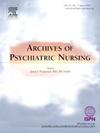Association between mental health literacy and formal help-seeking behaviors among students from the Palestinian-Arab minority in Israel
IF 2.2
4区 医学
Q1 NURSING
引用次数: 0
Abstract
Mental health problems are common among higher education students, yet formal help-seeking rates remain low. Mental health literacy (MHL) is crucial in facilitating help-seeking, but its relationship with formal help-seeking behaviors among ethnic minority students is poorly understood. This study explored MHL among Palestinian minority students in Israel using Jorm's framework, examining the association between each MHL dimension and formal help-seeking. It also investigated information-seeking methods and their relations to actual help-seeking.
129 Palestinian students completed measures of MHL, formal help-seeking, information-seeking methods, sociodemographic and clinical characteristics. Participants reported average or above-average levels on all MHL dimensions. Compared to those who did not report actual formal help-seeking, those who did have significantly higher levels of MHL on all dimensions, except for the ability to recognize disorders. The three dimensions - knowledge of risk factors and causes; knowledge of where to seek information; and attitudes that promote recognition or appropriate help-seeking behavior – were found to be significant determinants of formal help-seeking behaviors. Online information-seeking was an important determinant of formal help-seeking. This study supports the association between MHL and formal help-seeking behaviors, even among students from ethnic minorities. Interventions targeting MHL could enhance help-seeking behaviors in this population. This study underlines the crucial role of the Internet in minority students' lives in the context of mental health, similar to its importance in other areas of their lives. They also identify key areas for psychiatric mental health nursing to focus on for more effective education and interventions tailored to minority student populations.
以色列巴勒斯坦-阿拉伯少数民族学生的心理健康素养与正式求助行为之间的关系
心理健康问题在高校学生中很常见,但正式求助率仍然很低。心理健康素养(MHL)对促进求助至关重要,但人们对其与少数民族学生正式求助行为之间的关系知之甚少。本研究采用 Jorm 的框架探讨了以色列巴勒斯坦少数民族学生的心理健康素养,研究了心理健康素养各维度与正式求助行为之间的关系。129 名巴勒斯坦学生完成了对 MHL、正式求助、信息寻求方法、社会人口学和临床特征的测量。参与者在所有 MHL 维度上都达到了平均水平或高于平均水平。与那些没有报告实际正式求助的学生相比,那些报告了正式求助的学生在所有方面的 MHL 水平都明显较高,但识别疾病的能力除外。研究发现,三个维度--对风险因素和病因的了解;对在哪里寻求信息的了解;以及促进识别或适当求助行为的态度--是正式求助行为的重要决定因素。在线寻求信息是正式求助行为的重要决定因素。这项研究证实了多语言流利与正式求助行为之间的联系,即使在少数民族学生中也是如此。针对多语种流利说的干预措施可以加强这类人群的求助行为。本研究强调了互联网在少数族裔学生心理健康生活中的关键作用,这与互联网在他们生活的其他领域中的重要性类似。他们还指出了精神心理健康护理需要关注的关键领域,以便针对少数民族学生群体开展更有效的教育和干预。
本文章由计算机程序翻译,如有差异,请以英文原文为准。
求助全文
约1分钟内获得全文
求助全文
来源期刊
CiteScore
3.70
自引率
0.00%
发文量
131
审稿时长
160 days
期刊介绍:
Archives of Psychiatric Nursing disseminates original, peer-reviewed research that is of interest to psychiatric and mental health care nurses. The field is considered in its broadest perspective, including theory, practice and research applications related to all ages, special populations, settings, and interdisciplinary collaborations in both the public and private sectors. Through critical study, expositions, and review of practice, Archives of Psychiatric Nursing is a medium for clinical scholarship to provide theoretical linkages among diverse areas of practice.

 求助内容:
求助内容: 应助结果提醒方式:
应助结果提醒方式:


